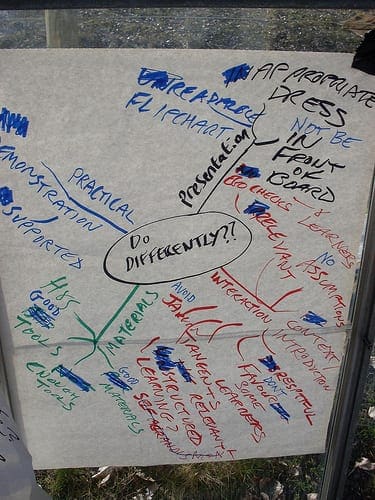
Favorite The two questions in this little conversation are evidence of a broken KM culture or system. It’s the sort of conversation most of us have had at some time on our lives. In this conversation we can see evidence of a missed opportunity to share knowledge (“I could have
Read More
 Shared by Nick Milton October 4, 2021
Shared by Nick Milton October 4, 2021

Favorite In 2008 David Snowden published a landmark article on 7 KM principle, mainly focusing on the supply side of knowledge management. The post below, upcycled from 2012, aims to present similar principles from the demand side. Principles by Nick Youngson CC BY-SA 3.0 Alpha Stock Images David’s 2008 post is currently (Nov
Read More
 Shared by Nick Milton November 9, 2020
Shared by Nick Milton November 9, 2020

Favorite Very often the Knowledge Management professional (especially the Knowledge Engineer) will get involved in the mechanics of Knowledge Capture. This is where they need to be fully objective, and avoid “leading the witness”. Image from Wikimedia If you, as Knowledge Manager, are involved in a Knowledge Capture service, the purpose
Read More
 Shared by Nick Milton August 12, 2020
Shared by Nick Milton August 12, 2020

Favorite An analysis of searches and queries can tell you a lot about the knowledge topics which are of the greatest value in your organisation. Analysing patterns of searches helps you to identify the emergent knowledge topics, the knowledge gaps, and the “hot potatoes” in your organisation, your community, or
Read More
 Shared by Nick Milton September 11, 2018
Shared by Nick Milton September 11, 2018

Favorite If you want a learning organisation, you need an organisation of learners. But what makes a good learner? Learner, by sangeight on Flickr Here’s an article called “Seven Characteristics of Good Learners” by Maryellen Weimer, which addresses just that question. According to Maryellen: Good learners are curious – They
Read More
 Shared by Nick Milton July 24, 2018
Shared by Nick Milton July 24, 2018

Favorite To learn from the past, we need to reflect on the past, and questions are crucial for prompting reflection. When you observe the conversations and presentations at conferences and in organisations, they are very often stories about the past. “We did this, we did that, this happened, we met
Read More
 Shared by Nick Milton July 10, 2018
Shared by Nick Milton July 10, 2018

Favorite Perhaps the most important skill for the KM professional is the skill of Questioning. Questions are the hook from which most of your knowledge hangs. Anyone with small children knows that itireless questioning underpins their early learning. The same principle applies in organisations. Making knowledge conscious, making it explicit,
Read More
 Shared by Nick Milton February 27, 2018
Shared by Nick Milton February 27, 2018

Favorite The KM iceberg is a common image, but what does it really mean? The Iceberg is a very familiar model within Knowledge Management, seen in many slide presentations. I first used it myself in the public domain, in an article in Knowledge management magazine, 2000, entitled “Mining the deep knowledge
Read More
 Shared by Nick Milton September 11, 2017
Shared by Nick Milton September 11, 2017

Favorite Reaching the Deep Knowledge often requires the help of a facilitator or interviewer, and there is a tell-tale sign that shows when you get there. “woman, thinking” by Robert Couse-Baker, on Flickr Superficial knowledge transfer happens all the time. A foreman leaves his job. The company arranges a hand-over
Read More
 Shared by Nick Milton June 9, 2017
Shared by Nick Milton June 9, 2017
Favorite Most knowledge sharing in our private lives is driven by Asking. Let’s use this in work as well. Think about the last time you shared knowledge with one of your friends or family. Maybe it was this morning, or yesterday – maybe you shared advice, a tip or hint,
Read More
 Shared by Nick Milton February 17, 2017
Shared by Nick Milton February 17, 2017
![]() Shared by Nick Milton October 4, 2021
Shared by Nick Milton October 4, 2021








